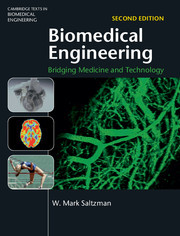Description
Biomedical Engineering (2nd Ed., Revised edition)
Bridging Medicine and Technology
Cambridge Texts in Biomedical Engineering Series
Author: Saltzman W. Mark
The second edition of this introductory textbook conveys the impact of biomedical engineering through examples, applications, and a problem-solving approach.
Language: English
Publication date: 05-2015
779 p. · 19.7x25.2 cm · Hardback
779 p. · 19.7x25.2 cm · Hardback
Description
/li>Contents
/li>Biography
/li>
The second edition of this popular introductory undergraduate textbook uses examples, applications, and profiles of biomedical engineers to show students the relevance of the theory and how it can be used to solve real problems in human medicine. The essential molecular biology, cellular biology, and human physiology background is included for students to understand the context in which biomedical engineers work. Updates throughout highlight important advances made over recent years, including iPS cells, microRNA, nanomedicine, imaging technology, biosensors, and drug delivery systems, giving students a modern description of the various subfields of biomedical engineering. Over two hundred quantitative and qualitative exercises, many new to this edition, help consolidate learning, whilst a solutions manual, password-protected for instructors, is available online. Finally, students can enjoy an expanded set of leader profiles in biomedical engineering within the book, showcasing the broad range of career paths open to students who make biomedical engineering their calling.
1. Introduction: what is biomedical engineering?; Part I. Molecular and Cellular Principles: 2. Biomolecular principles; 3. Biomolecular principles: nucleic acids; 4. Biomolecular principles: proteins; 5. Cellular principles; Part II. Physiological Principles: 6. Communication systems in the body; 7. Engineering balances: respiration and digestion; 8. Circulation; 9. Removal of molecules from the body; Part III. Biomedical Engineering: 10. Biomechanics; 11. Bioinstrumentation; 12. Bioimaging; 13. Biomolecular engineering I: biotechnology; 14. Biomolecular engineering II: engineering of immunity; 15. Biomaterials and artificial organs; 16. Biomedical engineering and cancer.
W. Mark Saltzman is the Goizueta Professor of Chemical and Biomedical Engineering at Yale University, and was the founding Chair of the Yale Department of Biomedical Engineering. He has taught numerous courses on topics in biomedical engineering over the last three decades, and has been widely recognised for his excellence in research and teaching. He is a Fellow of the American Institute for Medical and Biological Engineering and a Fellow of the Biomedical Engineering Society. He is also the recipient of the 2014 Mines Medal and has been elected to the Institute of Medicine.
© 2024 LAVOISIER S.A.S.




